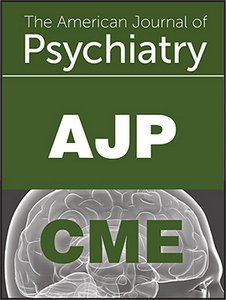Real-World Effectiveness of Menopausal Hormone Therapy in Preventing Relapse in Women With Schizophrenia or Schizoaffective Disorder.
IF 15.1
1区 医学
Q1 PSYCHIATRY
引用次数: 0
Abstract
OBJECTIVE Antipsychotic effectiveness in preventing relapse declines around menopausal age in women with schizophrenia or schizoaffective disorder (SSD). It is not known whether systemic menopausal hormone therapy (MHT) can help to prevent psychosis relapse. METHODS A within-subject study design was used to study the effectiveness of MHT in preventing relapse in a Finnish nationwide cohort of women with SSD between 40 and 62 years of age who used MHT during follow-up (1994-2017). Hazard ratios adjusted for age and psychotropic drug use were calculated for psychosis relapse as main outcome and any psychiatric hospitalization as secondary outcome. RESULTS The study population comprised 3,488 women using MHT. Use of MHT was associated with a 16% lower relapse risk (adjusted hazard ratio [aHR]=0.84, 95% CI=0.78-0.90) when compared to non-use. Stratified by age, MHT was associated with decreased relapse risks when used between ages 40-49 (aHR=0.86, 95% CI=0.78-0.95) and ages 50-55 (aHR=0.74, 95% CI=0.66-0.83), but not between ages 56-62 (aHR=1.11, 95% CI=0.91-1.37). Similar effectiveness was found for estrogen alone or combined with fixed or sequential progestogens (aHRs between 0.79 and 0.86), transdermal and oral formulations (aHRs 0.75-0.87), and for most specific formulations (aHRs 0.75-0.85), except tibolone (aHR=1.04, 95% CI=0.75-1.44) and formulations with dydrogesterone (aHR=1.05, 95% CI=0.85-1.30). Similar results were observed with any psychiatric hospitalization as outcome measure. CONCLUSIONS The findings underscore the potential value of MHT in preventing psychosis relapse among women with SSD of menopausal age. These findings translate clinical evidence on the neuroprotective effects of estrogens to real-world settings, encompassing a group of women for whom current antipsychotic treatment options may be insufficient.更年期荷尔蒙疗法在防止精神分裂症或情感分裂症女性患者复发方面的实际效果。
目的精神分裂症或分裂情感性障碍(SSD)女性患者更年期前后,抗精神病药物在预防复发方面的疗效下降。方法采用受试者内研究设计,在芬兰全国范围内对在随访期间(1994-2017 年)使用过更年期激素疗法的 40-62 岁精神分裂症女性患者队列中研究更年期激素疗法在预防复发方面的有效性。结果研究对象包括3488名使用MHT的女性。与不使用MHT相比,使用MHT的复发风险降低了16%(调整后危险比[aHR]=0.84,95% CI=0.78-0.90)。按年龄分层,在40-49岁(aHR=0.86,95% CI=0.78-0.95)和50-55岁(aHR=0.74,95% CI=0.66-0.83)之间使用MHT可降低复发风险,但在56-62岁之间不适用(aHR=1.11,95% CI=0.91-1.37)。雌激素单独使用或与固定或连续孕激素合用(aHRs 在 0.79 和 0.86 之间)、透皮和口服制剂(aHRs 0.75-0.87)以及大多数特定制剂(aHRs 0.75-0.85)的有效性相似,但替勃龙(aHR=1.04,95% CI=0.75-1.44)和含有地屈孕酮的制剂(aHR=1.05,95% CI=0.85-1.30)除外。结论:研究结果强调了MHT在预防更年期女性SSD患者精神病复发方面的潜在价值。这些研究结果将有关雌激素神经保护作用的临床证据应用到了现实环境中,其中包括了一群目前的抗精神病治疗方案可能无法满足其需求的女性。
本文章由计算机程序翻译,如有差异,请以英文原文为准。
求助全文
约1分钟内获得全文
求助全文
来源期刊

American Journal of Psychiatry
医学-精神病学
CiteScore
22.30
自引率
2.80%
发文量
157
审稿时长
4-8 weeks
期刊介绍:
The American Journal of Psychiatry, dedicated to keeping psychiatry vibrant and relevant, publishes the latest advances in the diagnosis and treatment of mental illness. The journal covers the full spectrum of issues related to mental health diagnoses and treatment, presenting original articles on new developments in diagnosis, treatment, neuroscience, and patient populations.
 求助内容:
求助内容: 应助结果提醒方式:
应助结果提醒方式:


